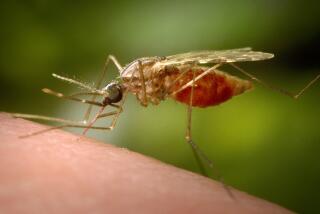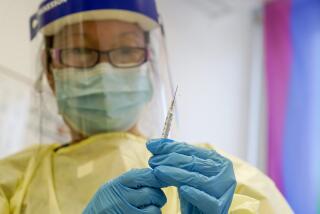Prevention and prompt attention are key to fighting malaria
- Share via
The first effective vaccine against malaria made news earlier this month as scientists reported success in fighting the mosquito-borne illness that strikes 400 million people annually worldwide.
In clinical trials in Africa, the vaccine prevented nearly half of new infections in children and reduced the number of serious cases by nearly 60%. But because more clinical trials are needed and manufacturing plants take five to six years to build, the new malaria vaccine isn’t expected to be widely available until 2010 at the earliest.
What can travelers do now? Certain precautions can reduce the odds of getting malaria or speed recovery. For U.S. travelers, malaria-related deaths are largely preventable, the Centers for Disease Control and Prevention reported in the Oct. 5 Annals of Internal Medicine.
CDC scientists tracked 185 fatal malaria cases involving U.S. residents from 1963 to 2001. They found that 123 contracted the disease while traveling, and 105 of those travelers’ deaths -- 85% -- were preventable.
The U.S. logs about 1,500 cases of malaria each year, nearly all contracted in another country. About 1% of those cases proves fatal, researchers said.
“Commonly travelers don’t take preventive medication or they don’t take it correctly,” said Dr. Monica Parise, a medical officer with the CDC and coauthor of the Annals paper. She added that travelers often did not seek medical care promptly or experienced delays in treatment.
Physicians can prescribe preventive medications, which vary depending on a traveler’s destination and the specific strains of the disease there. In many regions, the parasite has grown resistant to the anti-malarial drug chloroquine, previously a mainstay of prevention. Diagnosis also is key.
“The mosquitoes that transmit malaria tend to be small,” Parise said, “so the bite may not be recognizable.”
Medical errors, such as misdiagnosis or prescribing the wrong drug regimen, may have contributed to 70 of the deaths deemed preventable, Parise and her coauthors found. It’s crucial to report fever, chills or other symptoms to your doctor, especially the first three months after traveling to a malaria-prone area, she said. Treatment should begin within 24 hours of the onset of symptoms.
Fever was the most common symptom cited in the CDC survey, reported in nearly 78% of the fatal cases. Chills were reported 46% of the time. But in 19% of the fatal cases, the person did not report fever, chills or sweats.
Malaria is caused by one of four parasite strains, all spread by the bite of infected mosquitoes. In the CDC study, nearly 93% of the cases afflicting travelers involved the strain Plasmodium falciparum. “The regions where U.S. travelers are most likely to acquire malaria are West Africa and the Indian subcontinent,” Parise said.
The study’s conclusions reflect what travel medicine specialists know from their practice, said physician Vic Kovner, director of the Traveler’s Immunization Center in Bonsall, Calif.
“People tend to ignore mosquito-bite prevention,” Kovner said. Many decline to take anti-malarial drugs before and during travel. Though drugs such as Lariam and Malarone can kill the malaria parasite, patients often complain about their cost and side effects.
But Kovner tells patients to keep perspective: Although anti-malarial drugs cost $100 for a two-week course, an emergency airline ticket and medical evacuation are far more expensive.
The CDC has malaria information at www.cdc.gov/travel /diseases/malaria/index.htm.
Healthy Traveler appears every other week. Kathleen Doheny can be reached at kathleendoheny@earthlink.net.
More to Read
Sign up for The Wild
We’ll help you find the best places to hike, bike and run, as well as the perfect silent spots for meditation and yoga.
You may occasionally receive promotional content from the Los Angeles Times.






